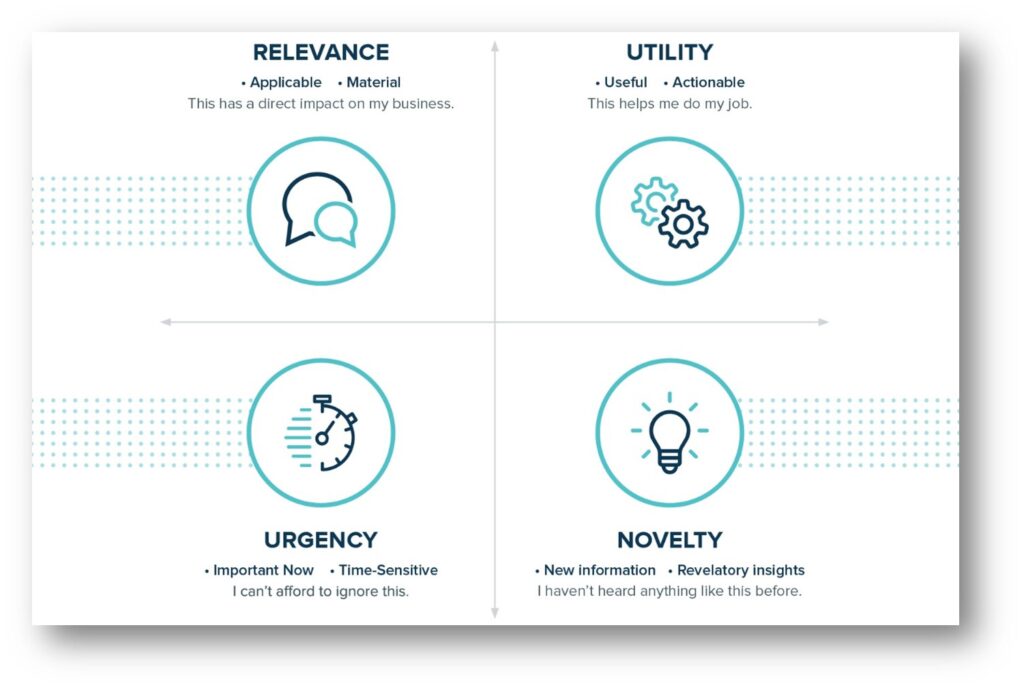March 8, 2024
AI is Reshaping Search. This Makes Creating Quality Content Even More Important

Generative AI is already threatening to change our lives and take our jobs—now, it’s coming for search. The implications are scaring content creators, including marketers at professional services firms who worry their experts’ thought leadership will get lost in a sea of AI-generated noise.
They have cause for concern. In addition to AI clogging up Google with more garbage SEO clickbait, search engines’ own generative AI-powered answers could give users all the information they need without requiring a click at all.
It might be tempting to cower in fear; after all, it’s hard enough to break through as it is, and that was when you were just competing against other people. But, as we’ve written before, the emergence of generative AI is actually a significant opportunity for professional services firms. That’s because they specialize in the niche, insightful, and timely perspectives on complex topics that AI, which merely generates content based on what’s already been said, can’t mimic.
Remember, the audiences that professional services firms want to reach (i.e., executive decision-makers) aren’t going to base multimillion-dollar decisions on four bullets spat out by an AI-powered search engine. They want strategic counsel from trusted authorities whose content shows they know what they’re talking about. And as you’ll see below, that kind of high-quality content still rises to the top.
What’s Actually Happening to Search?
It’s important to first clear up some common misconceptions about the current state of search. Namely: generative AI—and/or the use of generative AI in developing an article—won’t cause a drop in search rankings on its own.
Google’s SEO rules still apply, however complicated or ever-changing they may be. In fact, just this week Google announced adjustments to its search algorithm aimed at surfacing high quality, helpfulcontent over spammy, recycled results—effectively taking aim at content produced for the sole purpose of ranking highly.
Yet even as Google looks to limit low-quality content, existing SEO best practices—particularly those that help to balance readability and searchability—should still be applied. At their core, these include:
- Make your site accessible, fast, and optimized for mobile.
- Use multiple subheads that align with what people need to know and are searching for.
- Strategically weave in relevant, “winnable” keywords (those that balance search volume and ranking difficulty), and use clear, simple prose when possible.
- Demonstrate expertise, experience, authority, and trust (EEAT)—for instance, by citing links, firsthand examples, and drafting substantive bios for contributors.
In short, the quality of content being produced is still, and perhaps increasingly, a critical factor in SEO, whether you’re using generative AI to help you write it or competing with other AI-produced articles.
“We’ve given longstanding guidance to create content that’s first and foremost helpful, and we work very hard to ensure that our ranking systems reward content designed for people first. Many sites perform well on Search simply by creating this helpful content, without undertaking extensive SEO efforts,” Google spokesperson Jennifer Kutz told The Verge this January.
The real concern, then, is generative AI-powered tools offered by Google itself, which they’ve started to rollout through its “search generative experience” experiment, which summarizes results and presents it as the top answer. Worries follow: for instance, why go to a law firm’s article describing a new regulation when Google can answer the question itself?
On the other hand, as noted above, leading executives will make hiring decisions based on more than whether or not you can merely describe a new regulation. They’ll want to see that professional services firms can provide unique insights, points-of-view, or guidance in light of that regulation. Generative AI can’t replicate that.
The Opportunity for Professional Services Firms
So what will help your content rise in the search rankings?
Making it helpful and relevant. Ensuring it showcases expertise and experience. Using keyword research to identify targeted, but relevant search terms. Deploying clear, concise, and easy-to-follow prose. And making sure you’re talking about something unique and complex enough that it can’t be simply (or merely) answered or summarized by a robot.
This is familiar to us at Greentarget. After all, our North Star for strong thought leadership content has long been this matrix, highlighting the importance of relevancy, urgency, uniqueness, and utility:

Each day, we work with professional services firms to do just this. Our research team helps uncover winnable search terms that fill white space, ensuring our clients are speaking on timely topics that aren’t saturated with existing content—AI generated or not.
Our content team distills complex insights into clear, engaging prose, drawing out what’s most useful to key audiences and highlighting experts’ firsthand experience and unique perspectives. And our digital team optimizes those pieces for search, be it beefing up contributor bios, identifying strong keywords or revising subheads and headlines.
This has led to a timely IPO readiness guide discussing tax and accounting challenges for prospective public companies, an award-winning research report on M&A disputes, and countless bespoke topics that our media relations team has leveraged to secure highly visible opportunities for our clients—all of which drive real referrals and website traffic.
To sum up, here’s a quick primer:
- Showcase Expertise / Experience – Author bios with details on qualifications and well-researched content that demonstrates a deep and unique understanding of a topic.
- Manage / Build Authority – Ensure your existing online reputation is strong. With each article, try to increase the number of backlinks and sources citing the piece, and encourage sharing and engagement.
- Be Trustworthy – Be factual and accurate, cite trustworthy sources, make your content is accessible, and focus on quality content.
And remember the new golden rule: if generative AI can already say it, maybe you don’t need to say it at all. Quality content, that which is truly novel, distinctive and timely, still reigns supreme.
The Importance of Owned Content in the AI Era
Eventually, generative AI may cause organic search traffic to plummet on all but the most niche topics. Yet, as we’ve discussed above, this is an opportunity for professional services firms and thought leaders to stand out in a crowd: by creating unique and insightful content that only they can, based on their firsthand knowledge and experience.
But that’s not the only opportunity. In fact, as AI threatens already-struggling newsrooms, the importance of owned thought leadership content only grows. Fewer outlets and the declining viability of those outlets to rank high in search underscores the potential of owned content—be it a branded digital magazine, feature style articles and whitepapers, research reports, blogs, or LinkedIn posts.
These platforms put marketers back in the driver’s seat, empowering them to deploy targeted distribution strategies (e.g., email newsletters, paid social, even print) that are not (solely) at the whim of Google’s ever-fluctuating SEO rules. They can even complete the circle and provide fuel for earned media opportunities. Our IPO readiness guide, for instance, led to a byline opportunity for our client in TechCrunch.
To learn more, contact our team here.









